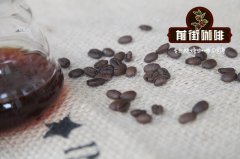How to judge whether a cup of coffee is good or bad? What is the measure?
Professional coffee knowledge exchange more coffee bean information please follow the coffee workshop (Wechat official account cafe_style)

Underextracted coffee
Insufficient extraction means that there are not enough coffee powder substances brought out by water, and there are many residual substances in coffee powder, which can increase the flavor of this cup of coffee.
Imagine a cup of espresso with a short extraction time, that is, a boutique Italian concentrated ristretto, with a smelly sour taste, a lack of sweetness, a strange salty taste and a disappointing finish. These four characteristics are obvious signs of insufficient extraction, let's take a closer look at the phenomenon of insufficient extraction.
Salty taste
At present, not everyone agrees with the author, but this part must insist that under-extracted coffee will be salty. This is not like "I'm sorry I added salt to the coffee" kind of salty, but underextracted coffee, almost always have the taste of the salty taste. From a tactile point of view, it's like being slippery in contact with alkaline food (please don't drink Amonia to feel the taste, believe me).
# Science Lecture-sour and salty tastes dissolve more easily than sweetness, which is why underextracted coffee has sour and salty tastes, and sweet substances do not have enough time or opportunity to dissolve completely.
Yu Yun is short.
The aftertaste of a well-extracted coffee can last for several minutes (or even a few hours of luck). It can be imagined that someone has put a piece of brown sugar on your tongue, or that you have just eaten a delicious taffy.
The underextracted coffee does not have this aftertaste. When you swallow the coffee, the flavor dissipates. There is no pleasant feeling left in your mouth, which makes you experience the short and unsatisfactory taste of this cup of coffee, which is bad and not delicious.
There are other bad feelings that represent insufficient extraction, but the above four items are more obvious and definite. Whenever you drink these properties, you can be sure that you are drinking coffee that is not sufficiently extracted. Over-extracted coffee, over-extracted coffee means to bring out too much soluble matter in the coffee, the result of this extraction is a bad flavor.
Imagine a cup of fine espresso with an extraction time of 40-50 seconds. Don't pretend you haven't tasted this exquisite coffee. This kind of coffee can be bitter and dry, which represents the most obvious feature of over-extracted coffee. Let's take a look at these characteristics again.
Bitter taste
We have all had bitter coffee. The over-extracted coffee is really bitter, and I don't want to have such a bitter taste unless I'm drinking Kimberly bitterness. Much of the bitterness comes from caffeine, but bitterness is also related to many other chemicals. Deep-roasted coffee will reach a charred state and form more bitter chemicals.
Astringent feeling
It is very uncomfortable to drink dry coffee in coffee, because the dryness is very strong and will last for a long time. This feeling is called astringency, just like you drink unsweetened black tea, new wine, overbrewed white wine. The astringency in wine comes from the polyphenol effect: these are chemicals that are easily found in plants, seeds and bark, and may also make coffee feel dry.
Polyphenols are bitter and bind to the proteins in your saliva. As most people know, polyphenols dry your tongue and produce a rustling or dry feeling in the mouth (this should not be confused with "crisp" or "dry" in wine. These adjectives indicate distinct acidity or low sweetness, not necessarily taste)
Important Notice :
前街咖啡 FrontStreet Coffee has moved to new addredd:
FrontStreet Coffee Address: 315,Donghua East Road,GuangZhou
Tel:020 38364473
- Prev

Claim to be the fiercest coffee? When is the coffee so strong?
Professional coffee knowledge exchange more information about coffee beans Please follow the coffee workshop (Wechat official account cafe_style) everyone who has tasted it says it is the strongest coffee in the world. The reason why it is called the most fierce is that it is said that the caffeine content of death wish is four times that of other similar species, which is called the most refreshing in the world. It is said that drinking will make you want to die. And the packaging is a good way to make people
- Next

Marago Rippi Coffee, which is 3 times larger than ordinary coffee beans. Introduction to Marrago Rippi Pigs
Professional coffee knowledge exchange more coffee bean information Please pay attention to the coffee workshop (Wechat official account cafe_style) sometimes see coffee beans are very big, is this a mutation? No ~ there are three kinds of elephant beans in coffee beans, and Marragozipi is one of them! The size of the coffee beans in Marrago Rippi is three times the size of ordinary coffee beans. Good or very good in Central America
Related
- Beginners will see the "Coffee pull flower" guide!
- What is the difference between ice blog purified milk and ordinary milk coffee?
- Why is the Philippines the largest producer of crops in Liberia?
- For coffee extraction, should the fine powder be retained?
- How does extracted espresso fill pressed powder? How much strength does it take to press the powder?
- How to make jasmine cold extract coffee? Is the jasmine + latte good?
- Will this little toy really make the coffee taste better? How does Lily Drip affect coffee extraction?
- Will the action of slapping the filter cup also affect coffee extraction?
- What's the difference between powder-to-water ratio and powder-to-liquid ratio?
- What is the Ethiopian local species? What does it have to do with Heirloom native species?

